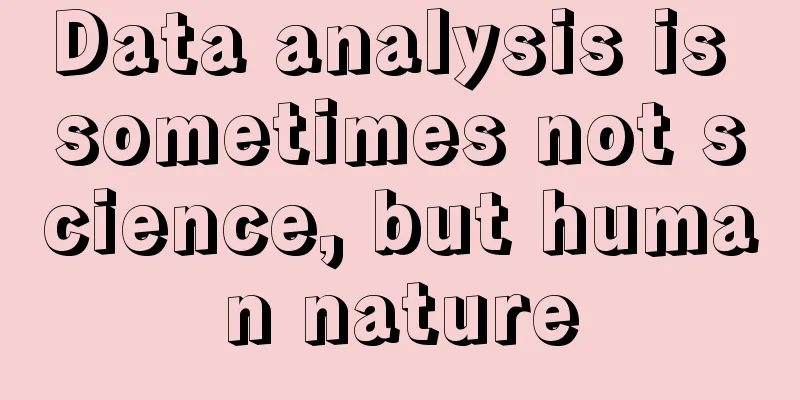Data analysis is sometimes not science, but human nature

I have been in the field of data analysis for 8 years, plus working in self-media for 2 years, and have encountered many scenarios and cases. Today, I would like to share some insights from the perspective of an insider with students who have just entered the industry. Of course, every family has its own problems: product managers are often blamed, and programmers also have to compete with products. What I am going to say next is not to say that data analysis is worthless or to discourage everyone, but to expose problems in order to solve them . This wave of data analysis in China began with the introduction of growth hackers from Silicon Valley in 2015, but the infrastructure of most companies has not kept up, which sometimes puts data analysts in an awkward position. The following is about the current situation of small and medium-sized companies, which make up the majority. First of all, there is the "contradiction" with various demand parties. 01 With the bossLet’s not talk about whether the data analysis results are useful. Is it just a question of logic? In fact, the boss often has the final say. If the boss says it is not true, then it is not true, no matter how rigorous the statistical probability method you use is. As a result, data analysis is basically oriented towards the boss and caters to the boss's ideas. 02 With direct supervisorSimilar to a boss, but a superior has another attribute: office politics . For example, a meeting is a performance in front of the boss, and the boss needs your data analysis to support your point of view and show your performance. In addition, there is a strange phenomenon for independent data departments: the boss will prevent data analysts from talking too much to the business. Sometimes, repeated problems that can be solved by making a template are not solved. Why? It's very simple. If the business can do it by themselves after getting the template, and even learn the analysis logic, then what is the point of the data analysis department? The value is gone? So we have to manually build the moat of the data department. 03 With business colleaguesThere is a concept in data science called: explainability, which means that if you cannot explain your analysis method including algorithm logic clearly, not only your boss but also your colleagues will not accept it. But often, especially when it comes to algorithms, it is a black box. Maybe you know it very well, but your business colleagues don’t understand it, or even don’t have data thinking, so there is no solution. What will be the consequences if the colleague refuses to admit his mistake? Either the data analyst compromises and simplifies the analysis logic, resulting in imprecise results and large errors, but the business can accept this . Or your business colleagues don’t help you implement the analysis conclusions and suggestions . 04 With HREven HR will find fault with you and ask whether your work is valuable. Where does value come from? There is only one place to test it: business growth . At this point you understand the previous point. If your business colleagues don’t help you implement it, your analysis will be floating in the air and worthless. Of course, your work is not completely worthless:
OK, let’s finish talking about external issues. In fact, many new data analysts also have “contradictions” in their own knowledge structure. 05 Focus on technology rather than businessMany newcomers think that knowing Python and SQL makes them data analysts. In fact, these technologies have no threshold and will not be your core competitiveness in the next 5-10 years. Insight into the business is . Compared with data analysis, data operation is easier to implement. Why? Because the latter is in the business team, while the former is often an independent department or a middle office department, far away from the business. What will this lead to? The analysis logic is divorced from business reality, and the suggestions given are far from business goals. Let me give you a very simple truth: always do things that are closest to money, and money comes from business. To put it more exaggeratedly, if you don’t understand the business, you can’t even build an indicator system . What should I do? As mentioned at the beginning, we expose problems in order to solve them, and then become data analysts who can generate value. 06 Exercise ability1. Understand the business and grasp the focusGo to the front line, or even rotate to the front line to sell goods, and get your hands dirty, so that you can understand how the business is done. Next, combine the idea of points, lines, surfaces and solids, from sorting out business processes to building business models, refer to the article: How Data Analysts Build "Business Models" to Deeply Understand the Business 2. Communication skills and building connectionsI usually maintain a good relationship with my business colleagues. If they smoke, I will pass them a cigarette and they will become my good friends. But I don’t smoke, and we can learn a lot from each other by having lunch together at noon. 3. Manage upward and think what the leader thinksFirst of all, you have to understand your superior: if it is a department leader, you must know that his situation is to reflect the value of the department and prevent other departments from backstabbing him. If it is a boss, you must understand what he wants? 4. Analyze logic and always focus on "implementation"What do we do with the information obtained from the first three points? We need to put it into the logic of data analysis: 1) The analysis logic should be integrated with business knowledge. For example, there are many ways to calculate the repurchase rate. Which one should we choose? It is based on business attributes. 2) Treat the analysis as a project, and let the business participate in the process. Synchronize with the business in a timely manner to analyze the problems you find during the process, discuss with the business about the possible reasons, and even create some suggestions together. Let the business feel involved so that they can understand the logic of the analysis. 3) Conclusion The reason for building personal connections by tying them to business KPIs is not only to understand the business, but also to obtain the latest business trends, such as problems exposed in monthly reports, quarterly goals, and business line plans. If your analysis conclusions can solve these problems, do you still worry about the business not being implemented? 4) Use upward management tools in a timely manner to help leaders share the burden
Author: Brother Biscuit; Official Account: Brother Biscuit Data Analysis |
<<: Middle-aged people seeking wealth fill 798 Night Market
>>: Business is the logic above the brand
Recommend
How much is the monthly rental for Amazon Australia? How is it charged?
Amazon has many sites. If you need to build a cros...
Why is there so few orders on Shopee? How to solve it?
In fact, there are many sellers in the market like...
How much does it cost to build an independent website? How much does it cost?
An independent website is a free website, and the ...
Cannes award-winning copywriting is here!
This article is selected from the "Cannes Ann...
How much is the salary of an Amazon merchant manager? What can they do for sellers?
There are two ways to open a store on Amazon. One ...
What does Amazon Logistics Information Association mean? Will there be any reminders?
On Amazon, both stores and accounts are linked, an...
What happens if an independent website infringes upon copyright? How to avoid infringement?
In the Internet age, more and more people choose t...
This article explains how brands can do Xiaohongshu store live streaming
How to do a good job of Xiaohongshu store live bro...
How to attract 1,000+ customers a day on Xiaohongshu?
The article provides a comprehensive and systemati...
What is the use of Amazon membership? What benefits can members enjoy?
Amazon membership is a title that only those who h...
The lie of Occam's razor
The principle of Occam's razor is often simpli...
How to pay taxes when doing cross-border e-commerce with Shopee? Do I have to pay taxes on cross-border income?
Now more and more merchants are opening stores on ...
After the brand went crazy, it actually sold like crazy!
Recently, there have been new attempts in brand ma...
Brands should reflect the status of consumers
Brands have not only changed our lifestyle, but al...
How does Scent Library, a perfume brand that sells 1 million bottles a year and is valued at over 100 million yuan, operate its private domain?
Local consumers' consumption habits for perfum...









